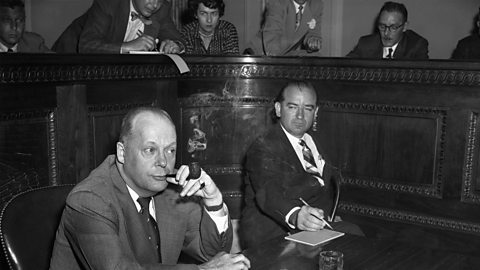McCarthyism
The rise of Senator Joseph McCarthy
Joseph McCarthy had fought in World War Two. In 1946 he was elected to represent the Republican PartyOne of the two major American political parties. Republicans tend to hold a more conservative viewpoint on politics and society. in the US SenateA chamber of the United States Congress, which together with the House of Representatives, makes up the legislature of the United States. McCarthy became the leading voice of anti-communism. His campaign against suspected communistSupporters of the communist movement or party. in the early 1950s became known as McCarthyismMcCarthyism was the campaign against alleged communists in the US government, led by Senator Joseph McCarthy.

McCarthy secured his role at the centre of the anti-communist movement by claiming he had the names of over 200 communists working in the government. He was eventually only able to name 57 suspects. He gave these to the Senate, which had the power to use the House Un-American Activities CommitteeHUACHouse Un-American Activities Committee investigated individuals suspected of communist beliefs or ties in America from 1938 onwards. Led by Senator Joseph McCarthy in the 1950s. to investigate these peopleâs links to communism An economic system in which all means of production such as tools, factories and raw materials, are owned by the community as a whole. Each individual contributes according to their ability and receives according to their needs. This means there is no hierarchy of social class. Even though all the names were already known to the Federal Bureau of InvestigationFBIFederal Bureau of Investigation. An agency set up by the US federal government to investigate criminal cases, where federal laws may have been broken. McCarthyâs claims strengthened his reputation as an anti-communist.
McCarthy was made the head of a White House committee to investigate suspected communists. In 1952 and 1953, he ruthlessly investigated anyone suspected of working against the USA by holding hearingAn official meeting in court. in the Senate. These were reported on in the media. Many who complained about his methods were accused by McCarthy of being communist or un-American.
McCarthyâs âwitch huntsâ
As McCarthyâs influence increased, he turned to even more extreme tactics. For example, he attacked army generals and President Harry Truman in his speeches. The televised Army-McCarthy hearings lasted for 36 days. McCarthy and the HUAC accused and interviewed thousands of people, resulting in many being blacklistedWhen a person is prevented from working in a particular industry or faces restrictions that exclude them from society for political reasons. from their careers. Journalists, actors and politicians were some of the groups targeted. After McCarthy had investigated them, their reputation as potential communist sympathisers made them unemployable.
McCarthyâs most high-profile target was General George Marshall, who was thought of as a hero in America for his efforts in World War Two. He had also been awarded the Nobel Peace Prize for his work to support Europe after 1945. McCarthy accused him of being part of a conspiracy against America. During his campaign to become president, the future president - Dwight D Eisenhower - chose not to defend Marshall in public, giving more credibility to McCarthy.
McCarthyâs efforts to find anyone linked to communism became known as the âwitch huntsâ. Over 100 university lecturers lost their jobs. Over 320 Hollywood actors were blacklisted, which meant they were not offered roles in the film industry.
Walt Disney was one of the leading voices to criticise communism. He refused to work with any suspected communist. He also gave the HUAC the names of former employees that he thought had links to communism.
McCarthyismâs impact on the media
Hollywood was consistently under investigation by the HUAC. Therefore, directors and actors made efforts to promote capitalistThe economic idea that countries should be run based on private business, trade, stocks and shares, and profit. values in their work to try to win favour with the government. Films such as The War of the Worlds (1953) pushed an anti-Soviet message.
Some children's comic book heroes who had previously fought the Nazis during World War Two were reintroduced in the 1950s to take on America's new enemy, the communists.
More guides on this topic
- African Americans c.1945-1954 - OCR A
- Civil rights in the USA 1954-1964 - OCR A
- Broadening of the campaigns for civil rights - Race - OCR A
- Broadening of the campaigns for civil rights - Women's rights - OCR A
- Broadening of the campaigns for civil rights - Gay rights - OCR A
- Politics and protest - OCR A
- Social problems and attempts to tackle them - OCR A